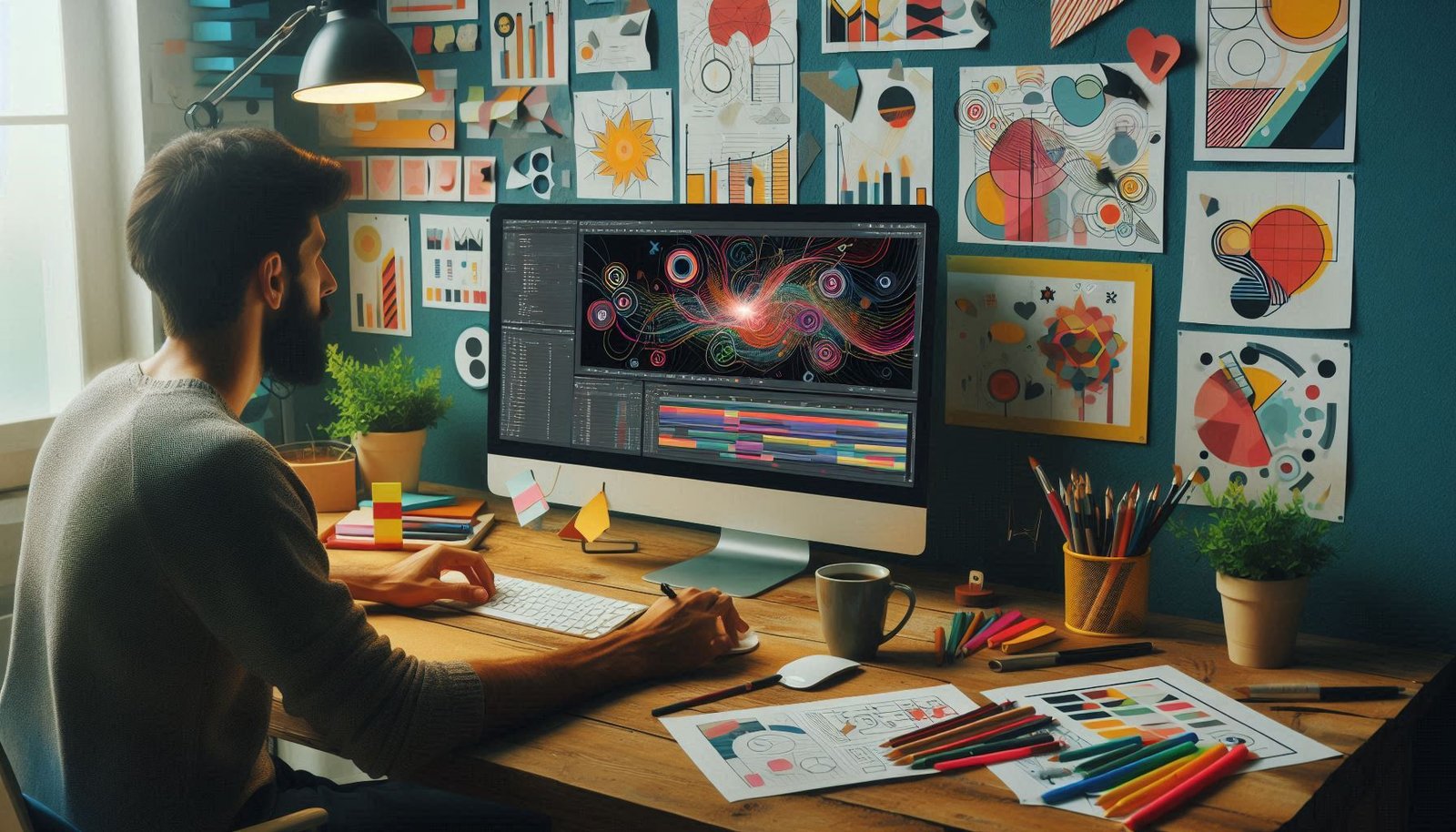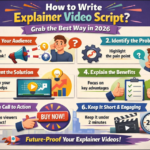
by: explainercue
-
June 21, 2024
-
Comments (0)
In today’s digital age, motion graphics videos are revolutionizing the way we communicate and engage with audiences. Whether you’re a business owner, marketer, or content creator, understanding how to create custom motion graphics videos can elevate your brand’s storytelling and captivate your audience like never before. This comprehensive guide will walk you through everything you need to know about creating stunning motion graphics videos, from the basics to advanced techniques.
Contents
- 1 What are Motion Graphics Videos?
- 2 The Importance of Motion Graphics in Marketing
- 3 Getting Started with Motion Graphics
- 4 Creating Custom Motion Graphics: Step-by-Step Guide
- 5 Advanced Techniques for Enhancing Motion Graphics
- 6 Best Practices for Creating Motion Graphics Videos
- 7 Pros and Cons of Using Motion Graphics
- 8 Examples of Effective Motion Graphics
- 9 Conclusion
What are Motion Graphics Videos?
Motion graphics refer to graphics that use video footage or animation technology to create the illusion of motion or rotation. They are typically combined with audio for multimedia projects. Unlike traditional static graphics, motion graphics can include elements such as animated text, shapes, and other graphic elements that move and change over time.
The Importance of Motion Graphics in Marketing
Incorporating motion graphics into your marketing strategy can significantly boost your engagement and conversion rates. Here are a few reasons why motion graphics are so powerful:
- Engaging Content: Motion graphics are visually appealing and can quickly capture the viewer’s attention.
- Simplified Information: They help simplify complex information, making it easier for the audience to understand.
- Versatile Usage: Motion graphics can be used across various platforms, including social media, websites, and presentations.
Getting Started with Motion Graphics
Understanding the Basics
Before diving into the creation process, it’s crucial to understand some fundamental concepts and tools:
- Storyboarding: This is the process of sketching out the visual sequence of your video. It helps plan the structure and flow of your motion graphics.
- Keyframes: These are the frames where a change occurs in the animation. By setting keyframes, you can control the motion of your graphics.
- Layers: In most motion graphics software, elements are organized in layers. This allows you to manipulate individual components without affecting the entire composition.
Choosing the Right Software
Selecting the right software is crucial for creating high-quality motion graphics. Here are some popular options:
- Adobe After Effects: This is the industry standard for creating motion graphics and visual effects. It offers a wide range of tools and features for professional-quality animations.
- Blender: An open-source software that provides comprehensive tools for 3D modeling, animation, and rendering.
- Cinema 4D: Known for its powerful capabilities in 3D motion graphics, this software is widely used in the industry.
Creating Custom Motion Graphics: Step-by-Step Guide
Step 1: Define Your Objectives
Before you start creating your motion graphics video, it’s essential to define your objectives. What message do you want to convey? Who is your target audience? Answering these questions will help guide your creative process.
Step 2: Develop a Concept and Storyboard
Once you have a clear objective, brainstorm ideas and develop a concept for your video. Create a storyboard to visualize the sequence of scenes and transitions. This step is crucial for ensuring a smooth workflow and effective storytelling.
Step 3: Design Your Elements
Design the graphic elements that will be used in your video. This includes text, shapes, icons, and images. Ensure that your designs are consistent with your brand’s style and message.
Step 4: Animate Your Graphics
Using your chosen software, start animating the graphic elements. Set keyframes to control the motion and transitions of your graphics. Pay attention to the timing and pacing to ensure a smooth and engaging animation.
Step 5: Add Audio
Audio is a critical component of motion graphics videos. Choose background music and sound effects that complement your visuals and enhance the overall experience. Make sure the audio levels are balanced and do not overpower the visuals.
Step 6: Review and Refine
Once your video is complete, review it thoroughly. Look for any inconsistencies or areas that need improvement. Make the necessary adjustments to ensure your video is polished and professional.
Advanced Techniques for Enhancing Motion Graphics
Utilizing 3D Elements
Incorporating 3D elements can add depth and realism to your motion graphics. Software like Blender and Cinema 4D are excellent for creating and animating 3D models. Use these tools to create dynamic and visually stunning graphics.
Motion Tracking
Motion tracking involves tracking the movement of objects in your footage and applying this movement to graphic elements. This technique is often used in visual effects to integrate motion graphics with live-action footage seamlessly.
Particle Effects
Particle effects can add an extra layer of visual interest to your motion graphics. These effects can simulate natural phenomena like fire, smoke, and rain, or create abstract visual patterns. Tools like Trapcode Particular in Adobe After Effects are perfect for creating particle effects.
Best Practices for Creating Motion Graphics Videos
Keep It Simple
Avoid overloading your video with too many elements or complicated animations. Keeping your design simple ensures that your message remains clear and easy to understand.
Focus on Storytelling
Every motion graphics video should tell a story. Focus on creating a compelling narrative that engages your audience from start to finish.
Optimize for Different Platforms
Different platforms have different requirements and best practices. Optimize your video’s format, size, and resolution for the platforms where it will be shared, whether it’s social media, your website, or a presentation.
Stay Consistent with Your Branding
Consistency is key when it comes to branding. Ensure that your motion graphics align with your brand’s colors, fonts, and overall style.
Pros and Cons of Using Motion Graphics
Pros:
- High Engagement: Motion graphics can capture and retain the viewer’s attention more effectively than static images or text.
- Versatility: They can be used in a variety of contexts, from marketing and education to entertainment and presentations.
- Simplified Communication: Complex ideas and data can be conveyed more clearly and quickly through motion graphics.
Cons:
- Time-Consuming: Creating high-quality motion graphics can be time-consuming and requires specialized skills.
- Cost: Professional motion graphics can be expensive to produce, especially if you need to hire a skilled animator.
Examples of Effective Motion Graphics
Marketing Campaigns
Many brands use motion graphics in their marketing campaigns to showcase products, explain services, or tell their brand story. For example, a tech company might use motion graphics to demonstrate how their new app works.
Educational Videos
Educational institutions and e-learning platforms use motion graphics to make learning more engaging. Animated explainer videos can break down complex topics into easy-to-understand visuals.
Social Media Content
Motion graphics are perfect for social media, where short, engaging content performs best. Brands often use animated posts, stories, and ads to capture attention and increase engagement.
Conclusion
Creating custom motion graphics videos is a powerful way to enhance your digital content and engage your audience. By understanding the basics, choosing the right tools, and following best practices, you can create stunning motion graphics that captivate and communicate effectively. Whether for marketing, education, or entertainment, motion graphics can elevate your content to new heights. Start experimenting with your ideas today and see the difference motion graphics can make for your brand.
For more insights and tips on video production and digital marketing, check out our other articles on video editing tips and social media strategies. Happy animating!
4o




